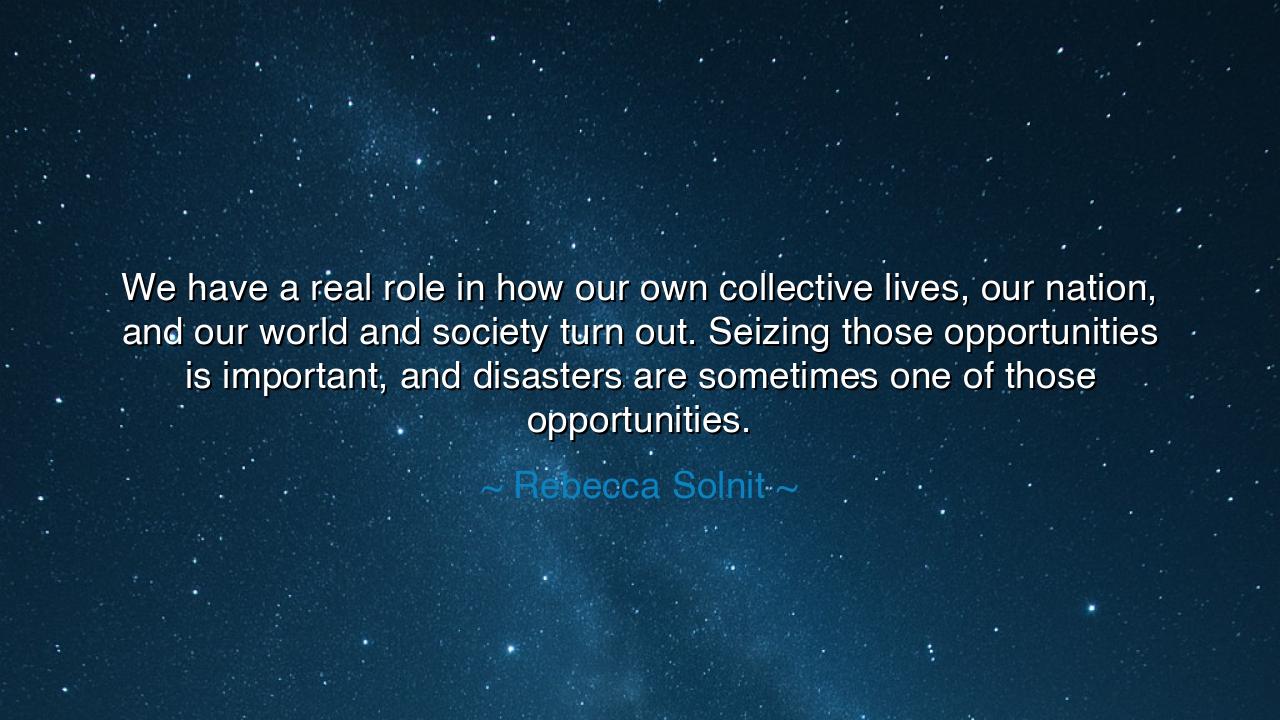
We have a real role in how our own collective lives, our nation
We have a real role in how our own collective lives, our nation, and our world and society turn out. Seizing those opportunities is important, and disasters are sometimes one of those opportunities.






Hear, O seekers of wisdom, the voice of Rebecca Solnit, a chronicler of human struggle and resilience, who declared: “We have a real role in how our own collective lives, our nation, and our world and society turn out. Seizing those opportunities is important, and disasters are sometimes one of those opportunities.” These words rise like a beacon, reminding us that fate is not only written in the stars but also in the courage of our hands. Though calamities may strike like fire from the heavens, they can open the door to transformation, if only we dare to step through.
For too often men and women believe themselves powerless, tossed upon the waves of history as leaves upon a storm. Yet Solnit unmasks this lie: every soul, every community, every generation has a role in shaping the future. The nation is not a distant throne, nor the world a realm beyond reach; both are molded by the daily choices of countless hearts. When disasters come, whether of fire, flood, or tyranny, they tear down the walls of illusion, showing us both our fragility and our strength.
Think of the great city of London in the year of the plague and the year of the fire. Pestilence swept through its streets, and flames devoured its houses. Yet from that ash and sorrow, the city rose anew, rebuilt with greater safety, stronger foundations, and renewed vision. The disaster, though cruel, became an opportunity for rebirth. What Solnit reminds us is that calamity, while it wounds, also clears the ground for the seeds of tomorrow.
Or recall the tale of the United States during the Great Depression. Hunger, unemployment, and despair seemed to herald ruin. But out of that dark valley emerged new institutions, new safeguards, and a spirit of shared responsibility that reshaped the society. Here again, the collective lives of a people, tested in fire, were turned toward renewal by leaders and citizens who seized the opportunity hidden within crisis. The lesson is plain: disasters reveal not only what is broken, but what must be remade.
Yet, O children of the future, hear also the warning: if the opportunity is not seized, the moment is lost. A disaster can birth tyranny as easily as it births reform. Fear may drive men into the arms of oppressors, or despair may cause them to abandon hope. Thus Solnit speaks truly—the outcome of our world and society depends not on the disaster itself, but on our response to it. The fire may destroy, but whether it leaves desolation or renewal depends upon the builders who rise from the ashes.
Therefore, let the lesson take root in your hearts: do not shrink from calamity, nor despair when storms arise. Instead, ask: what can be remade, what can be healed, what can be strengthened? In your communities, do not turn inward when disaster strikes; reach outward, for in collective labor lies salvation. In your nations, demand that leaders see crises not as excuses for oppression, but as calls to justice and reform. In your own life, when trials come, look for the hidden doorway they open, for every trial is also a teacher.
So remember Solnit’s words: our destiny is not sealed. We have a role, and in playing it with courage and wisdom, we shape the course of history. Even the darkest disasters carry within them the seed of new beginnings. Seize those opportunities, and from the rubble of what was, build the glory of what shall be.






AAdministratorAdministrator
Welcome, honored guests. Please leave a comment, we will respond soon